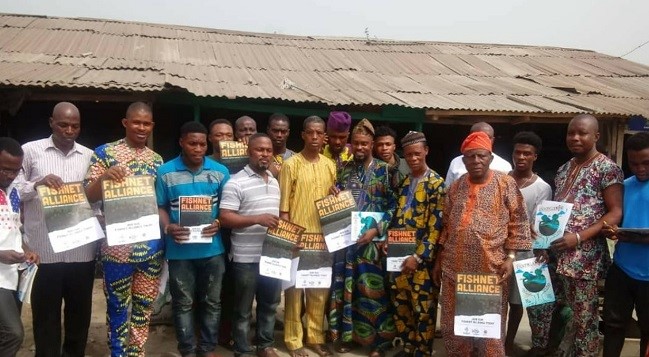The FishNet Alliance has called for support for fishers in Makoko, Lagos State and in other coastal communities across Nigeria. This call was made during a meeting of members of the Alliance in Makoko on Wednesday, August 19, 2020.

During the meeting, fishers organised under FishNet Alliance expressed how they groan under lockdown measures that have deprived them of access to fishing grounds and daily income to take care of their families.
It is estimated that the lockdown has thrown some 6.5 million fishers into abject stress.
There are stories of woes along the entire 850 km Atlantic coastline of Nigeria. Where fishers are not impacted by oil spills, they are limited by security cordons built around industrial facilities.
In places like Makoko, a community on the edges of the Lagos Lagoon, life is said to be precarious due to both the pandemic with heightened vulnerability due to the state of their environment.
Makoko is a community known for fishing but unfortunately its people and their livelihoods are reportedly suffering from pollution of their waters and constant threats of displacement from their prime location which luxury property developers desire to grab.
According to Akintimehin Claudius Adewole, leader of the Alliance in Lagos State, there are high activities of sand mining (dredging) going on in the area and this has severely impacted the livelihoods of the community people.
He called on the government to support the fishers and roll out policies that protect the aquatic environment, clean-up already polluted areas and guarantee the rights of the people to a decent livelihood as fishers.
Nnimmo Bassey, the Director of Health of Mother Earth Foundation (HOMEF), urges that adequate support systems should be in place to ensure the wellbeing of fishers whose services are essential.
“Without fish a vast population of Nigerians would go without that source of protein thus exacerbating the nutritional deficiencies in the population. Our fishers are among the most vulnerable of our country,” Bassey said, adding:
“Special measures including ensuring that wastes are not dumped into our water bodies to ensure healthy aquatic species and higher catch for the fishers. It is regretted that thousands of fish died off the Niger Delta coasts between February and May 2020 and to date there is no definitive statement from government about what killed the fish and what actions have been taken to avoid future occurrences.”
Officials of FishNet Alliance urged that relevant government agencies should work with fishers to develop policies that will help protect the aquatic ecosystems, especially in the restoration of polluted areas and the creation of freshwater and marine protected areas.
The outbreak of the COVID-19 pandemic and the restrictions on movement imposed by the government have impacted fishers and farmers in rural communities who have no formal jobs and who rely on their day-to-day expedition for their sustenance.
According to some of the fishers at the meeting, the pandemic has brought about disruptions in supply chains for fish due to disruptions in transportation, trade, and labour. Many people employed in the sector, such as fish vendors, processors, suppliers or transport workers, lost their jobs and subsistence has become a huge challenge.
Recognising how the pandemic worsens the situation for the fishers who were already vulnerable from the issues of pollution and displacements, HOMEF, during the meeting, extended food items to the fishers as a way of cushioning the impact of the environmental and socio-economic stress brought about by the pandemic.
The vice president of the association of fishers in Lagos State, Mr Segun Seminor, implored that the FishNet Alliance be extended to all five divisions of the fishermen association where fishers are also facing the challenge of pollution including from toxic chemicals.
At the end of the meeting, the group resolved and demanded that:
- Government should put adequate measures in place to help fishers during COVID-19 pandemic.
- There should be increased participation of fishers in public policies with regard to the aquatic environment.
- Traditional knowledge of fishing practices, including those that would help mitigate climate change impacts should be adopted in policies.
- All Indiscriminate displacement of fishing settlements and sand-filling of fishing creek, rivers and wetlands should be halted.
- Polluting corporations should be held liable for the harms created, required to clean-up immediately and to duly compensate the affected people and communities.
- Fishers should unite and engage in further dialogues to equip members with skills to serve as environmental defenders and as climate change.
FishNet Alliance is an Africa-wide network of fishers engaged in and promoting sustainable fishing in line with ecosystem limits. The Alliance opposes extractive activities in water bodies – including rivers, lakes, and oceans.
